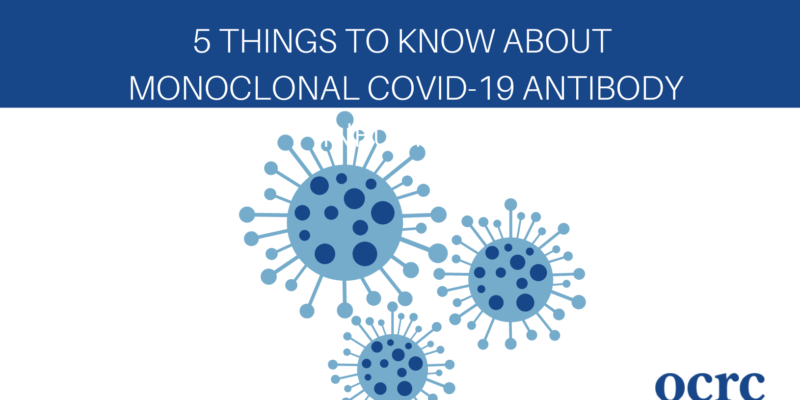
In the midst of the COVID-19 pandemic, researchers have been working diligently to combat the spread of SARS-CoV-2, or coronavirus. The development and administration of mRNA vaccines was certainly a big step forward; these life-saving vaccinesare proven to be the best defense against COVID-19.
However, there are some individuals who require additional defense against the novel coronavirus and its variants. According to Patrizia Cavazzoni, M.D., director of the FDA’s Center for Drug Evaluation and Research, there are certain immunocompromised individuals for whom the COVID-19 vaccine may not be sufficient, or even an option. This is where monoclonal antibody treatments enter the picture.
When infected with a virus, the immune system typically produces antibodies to target and destroy it. When that isn’t enough, artificial—or monoclonal—antibodies can help to supplement the natural immune system. These monoclonal antibodies mimic the body’s own response to the virus, speeding up the immune response and thus fighting off the virus more efficiently.
Monoclonal antibody infusions are an effective, widely available therapy designed to prevent severe illness due to COVID-19. In the United States, there are three COVID-19 monoclonal antibody treatments with FDA Emergency Use Authorization (EUA):
Certain people diagnosed with or exposed to COVID-19 are more likely to develop severe symptoms than others, and receiving an antibody infusion therapy can make a world of difference in terms of recovery. Here are five important things to know about this groundbreaking treatment:
While monoclonal antibody therapies are approved by the FDA for Emergency Use Authorization, it’s important to note that this is not the same as being FDA-approved.
This means that after limited clinical trials, it was determined that the benefits of the treatments outweigh the threat of COVID-19, and the treatment was approved for use.
In clinical trials, monoclonal antibody therapies showed a 70% reduction in hospitalizations and deaths related to COVID-19, and an 82% reduction in risk of contracting COVID-19 after exposure.
That said, it’s crucial that the therapy is administered as soon as possible after COVID-19 diagnosis or exposure, as it is effective within 10 days after symptoms first appear. If you receive a positive test result and have no symptoms, it’s still a good idea to consider the treatment—if you start showing symptoms later on, it may be too late.
Cost should never get in the way of a life-saving treatment. Fortunately, there is currently a standing order allowing patients to receive monoclonal antibody therapies without a prescription or referral, and at no cost at any State of Florida treatment site.
Please note, though, that insurance may be billed as applicable.
In previous clinical trials, some patients have reported flu-like side effects such as nausea, dizziness, fever, chills, headaches, coughing, and muscle aches. However, these symptoms are generally short-lived, and the benefits of monoclonal antibody infusions are proven to outweigh the risks.
Monoclonal antibody infusion therapies can be offered to those 12 years of age or older at high risk of illness due to COVID-19, regardless of vaccination status.
High risk factors include:
For those in Florida, click here to find a monoclonal antibody therapy center near you. You can also review the Frequently Asked Questions (FAQ) on Orlando Health to learn more about COVID-19 treatment and prevention.
